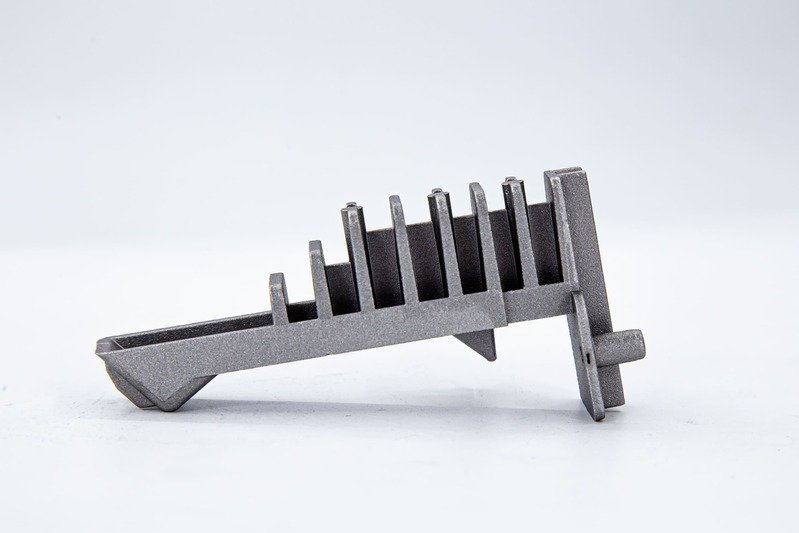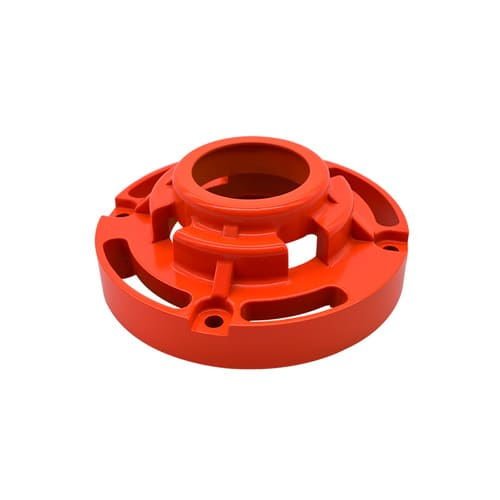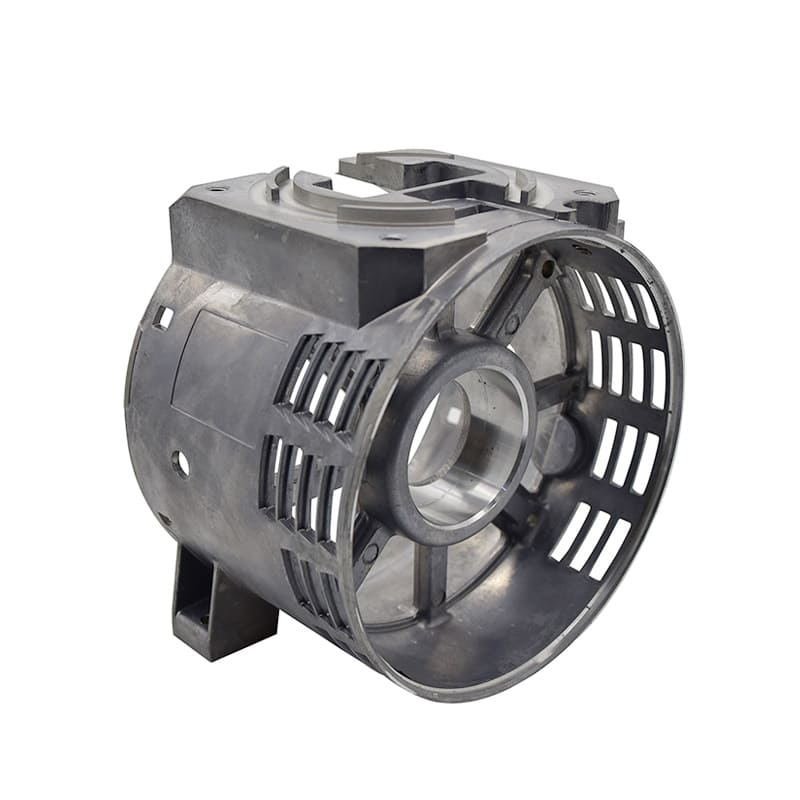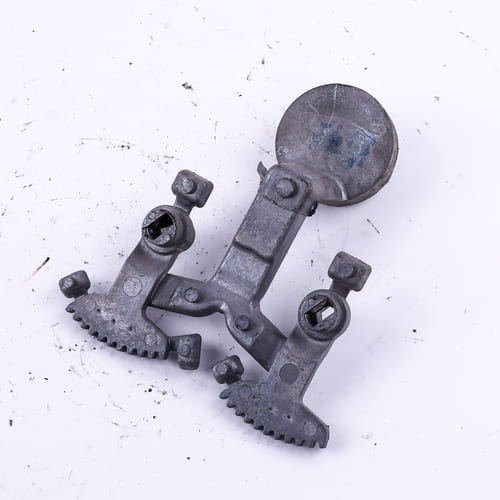There are four popular types of die cast metals. These are aluminum, magnesium, zinc, and copper alloys. Selecting an appropriate metal for your die-cast components can affect their overall quality and durability.
In this article we shall discuss the features of most common die cast metals including their properties. Similarly, we have also given comparison table of these metals along with their figures. Similarly, how can you choose the right metal for die casting other than aluminum?
Technical Data Analysis of Common Die-Cast Metals
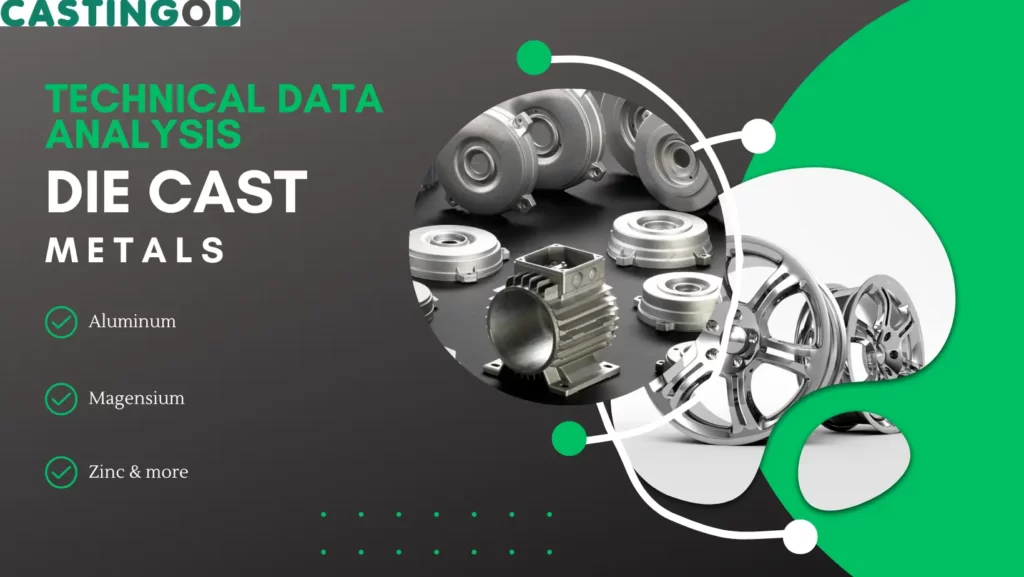
| Metal | Melting Point (°C) | Density (g/cm³) | Tensile Strength (MPa) | Yield Strength (MPa) | Hardness (HB) | Corrosion Resistance | Applications |
| Aluminum (A380) | 570 | 2.7 | 290 | 200 | 75 | Good | Engine blocks, housings, brackets |
| Magnesium (AZ91D) | 630 | 1.8 | 250 | 160 | 65 | Moderate | Automotive parts, electronics enclosures |
| Zinc (ZA17) | 419 | 6.6 | 340 | 240 | 80 | Excellent | Door handles, toys, electronics components |
| Copper (C11000) | 1085 | 8.9 | 220 | 110 | 50 | Fair | Electrical connectors, heat sinks, plumbing fittings |
| Steel (AISI 1045) | 1470 | 7.8 | 690 | 480 | 180 | Excellent | Gears, shafts, tools |
| Titanium (Grade 2) | 1660 | 4.5 | 550 | 345 | 180 | Excellent | Aerospace components, medical implants, sporting goods |
7 Types of Common Metals for Casting
Die-cast components are usually made of nonferrous, malleable metals, including:
- Gray iron
- Ductile iron
- Aluminum
- Copper
- Steel
- Zinc
- Magnesium
All the above metals provide properties like high strength, non-magnetic qualities, and corrosion resistance. Each metal has different uses in different casting processes, like:
- Hot chamber die-casting uses metals like aluminum, zinc, and magnesium because these metals have low melting points.
- Cold chamber die-casting uses metal like aluminum because it has a high melting point.
Gray Iron
Gray iron is a common casting material in manufacturing industries. It is a strong, flexible material that occupies a significant portion of the casting supply sector.
Gray iron has many advantages, like:
- Inexpensive in large quantities
- Can control Damping or vibration
- Has a high strength-to-weight ratios
- Has great Dimensional stability
- Can be customized according to application demands.
Ductile Iron
Ductile iron is an excellent alternative for processes that need more strength than gray iron casting. Ductile iron is similar to gray iron in many ways. They both offer a lot of the same properties. However, below are some additional characteristics of ductile iron:
- Greater strength
- Improved wear resistance
- It has reduced weight
- Reduced shrinkage
- Lower cost
Aluminum
Aluminum is also a popular metal due to its high fluidity. It is a versatile material and has vast uses in many casting processes.
Global Aluminum Market 2024
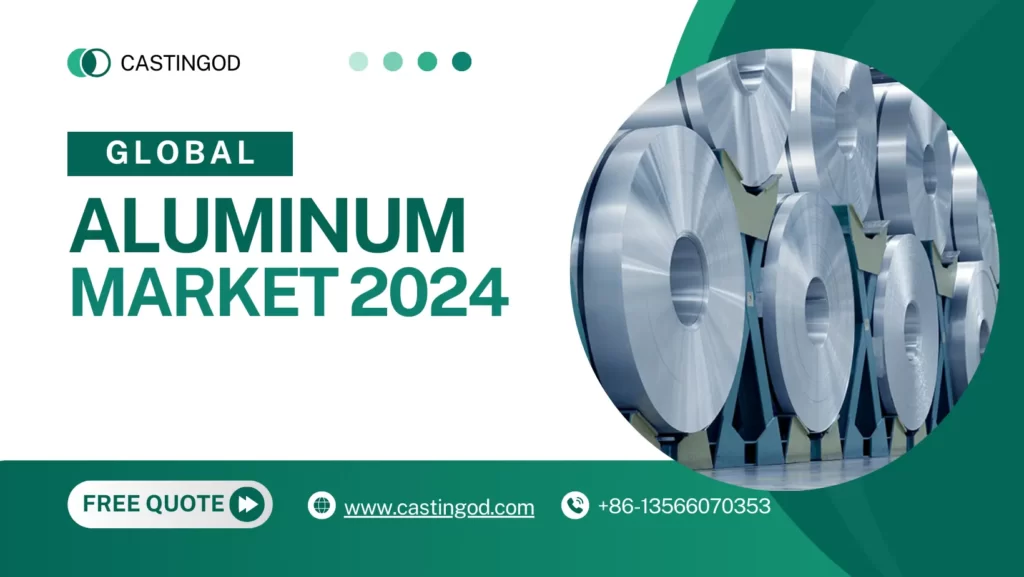
The global aluminum market is growing quickly and attracting the attention of major players and investors, like:
- EGA,
- Rusal,
- Norsk Hydro,
- Yinhai Aluminum,
- Alcoa,
- Rio Tinto,
- Xinfa Group,
- Alba,
- Chalco,
- Hindalco,
- SNTO,
- Aluar
The global aluminum market was worth USD 91060 million in 2022 and is expected to reach USD 111290 million by 2028.
According to the Global Market Report for aluminum rolled products, the market size for aluminum rolled products was $55.86 billion in 2023 and will be $59.98 billion in 2024, with a 7.4% compound annual growth rate.
Aluminum also has many advantages, like:
- Good thermal and electrical conductivity
- lightweight
- high strength-to-weight ratio
- highly corrosion resistant
- easy to cast
- recyclable
- High operating temperatures
Aluminum is an excellent choice for many casting processes, like:
- Die casting
- Permanent mold casting
- Lost foam casting
- Investment casting
- Squeeze casting
- Sand casting
- Hot isotonic pressing
Best Lightweight Aluminum Alloys for Complex Shapes
7075 aluminum and 6082 aluminum are the best lightweight aluminum alloys to achieve complex shapes with high precision.
Steel
Steel is a durable casting material. It works well for components that can face high loads, shock, or wear and tear.
Some additional properties of high-strength steel for die-casting are:
- It offers great durability
- Steel can endure stress.
- Steel offers high strength.
- Steel can easily be molded to form any desired shape
- It is light in weight
- Steels are easily welded
- It offers great heat resistance
- It can change magnetic response or thermal expansion.
Comparison Table Between Steel and Aluminum
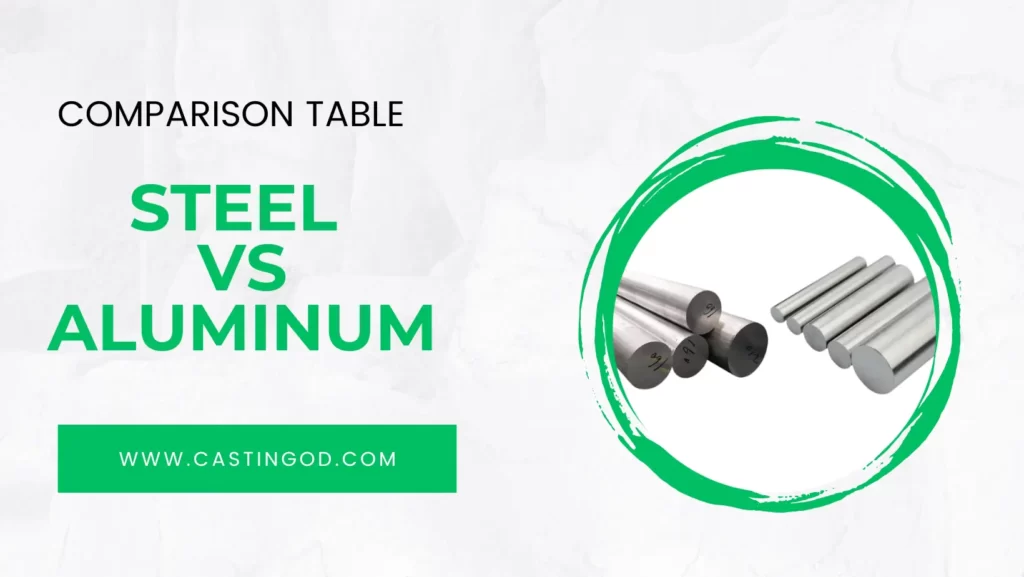
| Property | Steel | Aluminum |
| Weight | Heavier | Lighter |
| Strength | Higher | Moderate |
| Durability | Excellent | Good |
| Cost | Generally Higher | Generally Lower |
| Corrosion Resistance | Excellent, Wide Range | Good, Specific Environments |
| Application Suitability | Medical, Marine, and Industrial | Aerospace and Automotive |
| Recycling and Environmental | Highly Recyclable, Higher Energy | Highly Recyclable, Lower Energy |
Copper
Copper is a good electrical conductor. It is considered to be the best casting material. It has lots of applications in the construction sector for electrical components.
Copper has many advantages, like:
- High strength
- Good malleability
- Superior ductility
- Good conduction of heat
- Excellent wear resistance
- Good electrical conductivity
However, copper can also cause surface cracking, porosity, and other interior cavity formations. That’s why it is often used with other metals like silicon, nickel, zinc, chromium, tin, and silver to cause these defects.
Zinc
Zinc has a low melting point of 425 degrees Celsius. That’s’ why it is a good material for die-cast applications. It is quite simple to cast due to its quick fill and fast properties.
Zinc is an affordable metal for small casting of high-volume components. It is excellent for many die-cast parts due to its dimensional stability, clean surface finish, and tight tolerances.
Zinc offers following properties, like:
- Low melting point
- Corrosion resistant material
- Quality finishes
- High electrical conductivity
- Can be cold-formed
- Can be cast with thin walls
- Useful for complex shapes
The Increasing Demand for Other Metals in Die-Casting
The demand for other metals like magnesium and titanium is also growing in die-casting. Both metals are cost-effective and have excellent strength, stability, and durability. They are very helpful for intricate shapes and tight tolerances.
As a result, many die-casting companies prefer them for complex shapes and components in a variety of applications.
Magnesium
Magnesium is an extremely lightweight structural material available on Earth. It offers excellent properties, like a high strength-to-weight ratio and the best rigidity. It has excellent EMI and RFI shielding qualities, which make it ideal for many types of electrical housing and connectors. It is also used in hospitals to shield medical equipment and laboratories from other irritating signals.
Did you know that magnesium is much cheaper than many other engineered thermoplastic materials?
Magnesium has following features, like:
- High electrical and thermal conductivity
- Good heat dissipation properties
- High dimensional accuracy and stability
- Exceptional thin wall capability
- Good corrosion resistance
- Excellent finishing characteristics
Differences Between Aluminum Die-Cast Parts and Magnesium Die-Cast Parts
| Aluminum Die Casting | Magnesium Die Casting |
| Die casting alloys are mainly cast using cold chamber equipment | Most die casting alloys require hot chamber equipment |
| Aluminum parts cannot achieve thinner walls than magnesium | Magnesium parts can achieve thinner walls than aluminum |
| Aluminum parts are cheaper than magnesium | Magnesium parts are costlier than aluminum |
| Aluminum parts are Heavier than magnesium | Magnesium parts are lighter than aluminum |
| Aluminum parts have excellent corrosion resistance | Magnesium parts have poor corrosion resistance |
| Casting cycles are longer | Magnesium parts have very short casting cycles |
| Aluminum parts are more stable under stress | Magnesium parts have poor tensile strength and are not so stable |
Titanium
Titanium is a good material for the casting process. It has properties like good corrosion resistance and a high strength-to-weight ratio. It has many applications for:
- Sporting goods
- Medical
- Marine
- High-performance automotive applications
Titanium has many other advantages, like:
- Corrosion resistant
- Lightweight metal
- Excellent high-strength properties
- Good heat-resistant
- It is very ductile
- It has a low thermal expansion
- It offers excellent fatigue resistance
Choosing the Right Metal for Die-Casting
While choosing any metal for your die-casting project, always consider metal strength and the following factors:
- Cost of material
- Corrosion resistance
- Physical properties
- Mechanical strength
- Strength-to-weight ratio
- Required process, whether hot or cold chamber
- Surface finishing requirements
- Post-processing requirements and cost
Metal Strength Chart
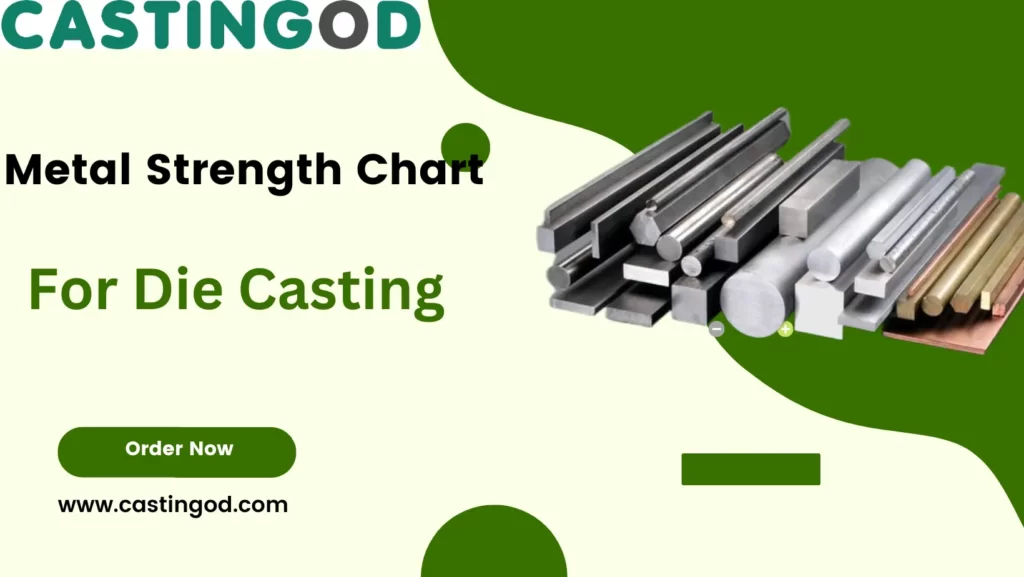
| Types of Metals | Tensile Strength (PSI) | Yield strength (PSI) | Hardness Rockwell (B-Scale) | Density (Kg/m³) |
| Stainless steel 304 | 90,000 | 40,000 | 88 | 8000 |
| Aluminum 6061-T6 | 45,000 | 40,000 | 60 | 2720 |
| Aluminum 5052-H32 | 33,000 | 28,000 | 2680 | |
| Aluminum 3003 | 22,000 | 21,000 | 20 to 25 | 2730 |
| Steel A36 | 58-80,000 | 36,000 | 7800 | |
| Steel Grade 50 | 65,000 | 50,000 | 7800 | |
| Yellow Brass | 40,000 | 55 | 8470 | |
| Red Brass | 49,000 | 65 | 8746 | |
| Copper | 28,000 | 10 | 8940 | |
| Phosphor Bronze | 55,000 | 78 | 8900 | |
| Aluminum Bronze | 27,000 | 77 | 7700-8700 | |
| Titanium | 63,000 | 37,000 | 80 | 4500 |
In this article, we have discussed many die-cast metals for die-casting processes. Always discuss with your die-casting manufacturer the right metal for your project. It can be best for making the right decision.


